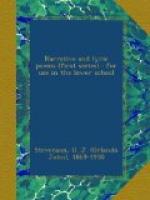Then the fierce trumpet-flourish
From earth to heaven arose.
630
The kites know well the long stern swell
That bids the Romans close.
Then the good sword of Aulus
Was lifted up to slay:
Then, like a crag down Apennine,
635
Rushed Auster through the
fray.
But under those strange horsemen
Still thicker lay the slain:
And after those strange horses
Black Auster toiled in vain.
640
Behind them Rome’s long battle
Came rolling on the foe,
Ensigns dancing wild above,
Blades all in line below,
So comes the Po in flood-time
645
Upon the Celtic plain:[61]
So comes the squall, blacker than night,
Upon the Adrian main.
How, by our Sire Quirinus,[62]
It was a goodly sight
650
To see the thirty standards
Swept down the tide of flight.
So flies the spray of Adria
When the black squall doth
blow,
So corn-sheaves in the flood-time
655
Spin down the whirling Po.
False Sextus to the mountains
Turned first his horse’s
head;
And fast fled Ferentinum,
And fast Lanuvium fled.
660
The horsemen of Nomentum
Spurred hard out of the fray,
The footmen of Velitrae
Threw shield and spear away.
And underfoot was trampled,
665
Amidst the mud and gore,
The banner of proud Tusculum,
That never stooped before:
And down went Flavius Faustus,
Who led his stately ranks
670
From where the apple-blossoms wave
On Anio’s echoing banks,
And Tullus of Arpinum,
Chief of the Volscian aids,
And Metius with the long fair curls,
675
The love of Anxur’s
maids,
And the white head of Vulgo,
The great Arician seer,
And Nepos of Laurentum,
The hunter of the deer;
680
And in the back false Sextus
Felt the good Roman steel;
And wriggling in the dust he died,
Like a worm beneath the wheel:
And fliers and pursuers
685
Were mingled in a mass;
And far away the battle
Went roaring through the pass.
[The Dioscuri ride to Rome with news of victory. No one dares to ask who they are, and after washing their steeds in Vesta’s fountain they vanish from mortal sight.]
XXXVII
Sempronius Atratinus
Sate in the Eastern Gate,
690
Beside him were three Fathers,
Each in his chair of state;
Fabius, whose nine stout grandsons
That day were in the field,
And Manlius, eldest of the Twelve[63]




